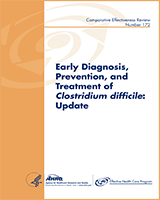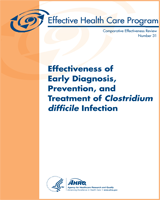NCBI Bookshelf. A service of the National Library of Medicine, National Institutes of Health.
This publication is provided for historical reference only and the information may be out of date.
Structured Abstract
Objectives:
To conduct a systematic review and synthesize evidence for differences in the accuracy of diagnostic tests, and the effects of interventions to prevent and treat Clostridium difficile infection (CDI) in adult patients.
Data Sources:
Searching for relevant literature was conducted in MEDLINE, the Cochrane Library, and Allied and Complementary Medicine (AMED). ClinicalTrials.gov and expert consultants provided leads to additional studies. We also manually searched reference lists from relevant literature.
Review Methods:
Standard Evidence-based Practice Center methods were employed. Screening of abstracts and full text articles to identify studies meeting inclusion/exclusion criteria was performed by two independent reviewers. High-quality direct comparison studies were used to examine differences in diagnostic tests. Randomized controlled trials (RCTs) were used to examine comparative effectiveness of antibiotic treatment for CDI. Quality of data extraction was checked by separate reviewers. Quality ratings and strength of evidence grading was performed on included studies. Evidence on diagnostic tests was quantitatively synthesized focusing on differences between test sensitivities and specificities. Evidence on antibiotic treatment was quantitatively examined using pooled analysis. Qualitative narrative analysis was used to synthesize evidence from all available study types for environmental prevention and nonstandard prevention and treatment, with the exception of probiotics as primary prevention, for which a forest plot is provided.
Results:
Overall, literature was sparse and strength of evidence was generally low due to small sample sizes or lack of adequate controls. For diagnostic testing, direct comparisons of commercially available enzyme immunoassays for C. difficile toxins A and B did not find major differences in sensitivity or specificity. Limited evidence suggests that tests for genes related to the production of C. difficile toxins may be more sensitive than immunoassays for toxins A and B while the comparisons of these test specificities were inconsistent. Moderate evidence in favor of antibiotic restriction policies for prevention was found. Environmental preventive interventions such as glove use and disposable thermometers have limited evidence. However, this literature is largely based on controlling outbreaks. Use of multiple component interventions further limits the ability to synthesize evidence in a meaningful way. Numerous potential new forms of treatment are being examined in placebo controlled RCTs, case series, and case reports. For standard treatment, no antimicrobial is clearly superior for the initial cure of CDI. Recurrence is less frequent with fidaxomicin than with vancomycin. Monoclonal antibodies for prevention and fecal flora reconstitution for multiple recurrences appear promising.
Conclusions:
Given the frequency and severity of CDI and the fact that future reimbursement policy may withhold payment for hospital-acquired infections, this is an under-researched topic. More precise estimates of the magnitude of differences in test sensitivities and specificities are needed. More importantly, studies have not established that any of the possible differences in test accuracy would lead to substantially different patient outcomes in clinical practice. More research on effective treatment and unintended consequences of treatment, such as resistance, is needed. Gut flora may be important, but improved understanding of healthy gut ecology and the complex interactions is necessary before continuing to pursue probiotics.
Contents
- Preface
- Acknowledgments
- Executive Summary
- Introduction
- Methods
- Results
- Key Question 1 How do Different Methods for Detection of Toxigenic C. difficile Compare in Their Sensitivity and Specificity?
- Key Question 2 What are Effective Prevention Strategies?
- Key Question 3 What are the Comparative Effectiveness and Harms of Different Antibiotic Treatments?
- Key Question 4 What are the Effectiveness and Harms of Nonstandard Adjunctive Interventions?
- Summary and Discussion
- References and Included Studies
- Abbreviations
- Glossary of Terms
- Appendixes
Prepared for: Agency for Healthcare Research and Quality, U.S. Department of Health and Human Services1, Contract No. 290-02-0009 (EPC2). Prepared by: Minnesota Evidence-based Practice Center, Minneapolis, Minnesota
Suggested citation:
Butler M, Bliss D, Drekonja D, Filice G, Rector T, MacDonald R, Wilt T. Effectiveness of Early Diagnosis, Prevention, and Treatment of Clostridium difficile Infection. Comparative Effectiveness Review No. 31 (Prepared by the Minnesota Evidence-based Practice Center under Contract No. 290-02-0009.) AHRQ Publication No. 11(12)-EHC051-EF. Rockville, MD. Agency for Healthcare Research and Quality. December 2011.
This report is based on research conducted by the Minnesota Evidence-based Practice Center under contract to the Agency for Healthcare Research and Quality (AHRQ), Rockville, MD (Contract No. 290-02-0009—EPC2). The findings and conclusions in this document are those of the authors, who are responsible for its content, and do not necessarily represent the views of AHRQ. No statement in this report should be construed as an official position of AHRQ or of the U.S. Department of Health and Human Services.
The information in this report is intended to help clinicians, employers, policymakers, and others make informed decisions about the provision of health care services. This report is intended as a reference and not as a substitute for clinical judgment.
This report may be used, in whole or in part, as the basis for the development of clinical practice guidelines and other quality enhancement tools, or as a basis for reimbursement and coverage policies. AHRQ or U.S. Department of Health and Human Services endorsement of such derivative products may not be stated or implied.
No investigators have any affiliations or financial involvement (e.g., employment, consultancies, honoraria, stock options, expert testimony, grants or patents received or pending, or royalties) that conflict with material presented in this report.
- 1
540 Gaither Road, Rockville, MD 20850; www
.ahrq.gov
- Review Early Diagnosis, Prevention, and Treatment of Clostridium difficile: Update[ 2016]Review Early Diagnosis, Prevention, and Treatment of Clostridium difficile: UpdateButler M, Olson A, Drekonja D, Shaukat A, Schwehr N, Shippee N, Wilt TJ. 2016 Mar
- Review Screening for Cognitive Impairment in Older Adults: An Evidence Update for the U.S. Preventive Services Task Force[ 2013]Review Screening for Cognitive Impairment in Older Adults: An Evidence Update for the U.S. Preventive Services Task ForceLin JS, O'Connor E, Rossom RC, Perdue LA, Burda BU, Thompson M, Eckstrom E. 2013 Nov
- Review Screening for Chronic Obstructive Pulmonary Disease: A Systematic Evidence Review for the U.S. Preventive Services Task Force[ 2016]Review Screening for Chronic Obstructive Pulmonary Disease: A Systematic Evidence Review for the U.S. Preventive Services Task ForceGuirguis-Blake JM, Senger CA, Webber EM, Mularski R, Whitlock EP. 2016 Apr
- Review Screening for Colorectal Cancer: An Updated Systematic Review[ 2008]Review Screening for Colorectal Cancer: An Updated Systematic ReviewWhitlock EP, Lin J, Liles E, Beil T, Fu R, O'Connor E, Thompson RN, Cardenas T. 2008 Oct
- Review Screening for High Blood Pressure in Adults: A Systematic Evidence Review for the U.S. Preventive Services Task Force[ 2014]Review Screening for High Blood Pressure in Adults: A Systematic Evidence Review for the U.S. Preventive Services Task ForcePiper MA, Evans CV, Burda BU, Margolis KL, O’Connor E, Smith N, Webber E, Perdue LA, Bigler KD, Whitlock EP. 2014 Dec
- Effectiveness of Early Diagnosis, Prevention, and Treatment of Clostridium diffi...Effectiveness of Early Diagnosis, Prevention, and Treatment of Clostridium difficile Infection
Your browsing activity is empty.
Activity recording is turned off.
See more...

